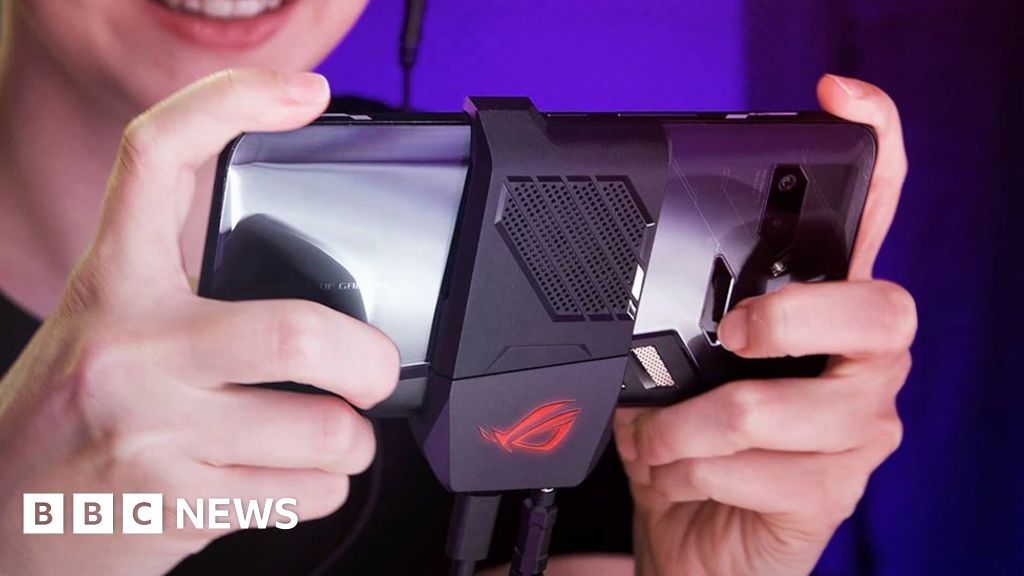Asus 'phone With A Fan' Among Weird Gadgets At Computex

 Image copyright
Asus
Image copyright
Asus
A gaming phone with a removable fan, and a dual-screen laptop are among the new gadgets on show at the Computex conference in Taiwan.
Computer giant Asus revealed a powerful handset designed for gamers that comes with a clip-on fan to keep it cool during "strenuous gaming sessions".
It also showed off new laptops with dual screens, which it plans to sell in 2019.
But rival Lenovo was criticised for over-hyping its "all screen" phone.
One for gaming fans
Asus's gaming phone is the first Android-powered smartphone to be produced under the Republic of Gamers brand.
Its screen is capable of displaying 90 frames per second (fps) - more than regular phones - to make games play more smoothly.
There is also a range of accessories, including clip-on controllers that are vaguely reminiscent of the Nintendo Switch console.
A clip-on fan is also included in the box to stop the high-performance phone overheating.
Technology news site The Verge said it was the "highest-specced Android phone ever", although there are not many games available on Android that take full advantage of the souped-up hardware.
Specs appeal
Computers powered by Intel chips typically have central processing units (CPUs) with four or six cores, allowing them to throw more "brainpower" at tasks when needed.
At present, Intel's top-end chips - the X-series - feature 18 cores, and cost up to $1,799.
But, at Computex, Intel revealed it was working on something substantially more powerful - a 28-core processor suitable for desktop computers, which is due to go on sale before the end of the year.
The chips will be based on Intel's existing 14-nanometre production process.
The move may help compensate for the fact that Intel's 10-nanometre chips are long overdue because of production issues. Shrinking the transistors to a smaller size should offer efficiency gains that mean power users will require fewer cores.
However, gamers who might be tempted should be aware that many titles cannot take advantage of more than four cores.
Intel has made 28-core chips before, but those Xeon series processors were designed for high-end computer servers rather than an individual's use.
Are two screens better than one?
Asus also revealed a range of new laptop computers with two screens.
The trackpad on its new Zenbook Pro has been replaced with a 14cm (5.5in) touchscreen that can display photographs, menus and tools such as a calculator or calendar.
There was also a concept laptop with two screens instead of a keyboard, which the company has called Project PreCog.
"Even in laptops, the goal is to be all screen," said Isa Rodriguez, from the technology site Gadget Match.
Over-hyped
However there was disappointment when Lenovo revealed its new Z5 smartphone.
In May, the company had shared images online that implied the phone would be "all screen" on the front, rather than having the "notch" that appears on the iPhone X and imitators.
Critics said Lenovo had posted misleading images and that the actual announcement was "disappointing".
"The new phone, which was teased to be a nigh bezel-less display without a notch or a chin, has debuted with both of them present," wrote Michael Allison, from news site Neowin.
Chinese phone-maker Vivo may instead become the first company to release a genuinely "all screen" phone.
It plans to unveil its Nex phone - which features an in-screen fingerprint reader and a selfie camera that pops out of its side - on 12 June.
From Chip War To Cloud War: The Next Frontier In Global Tech Competition
The global chip war, characterized by intense competition among nations and corporations for supremacy in semiconductor ... Read more
The High Stakes Of Tech Regulation: Security Risks And Market Dynamics
The influence of tech giants in the global economy continues to grow, raising crucial questions about how to balance sec... Read more
The Tyranny Of Instagram Interiors: Why It's Time To Break Free From Algorithm-Driven Aesthetics
Instagram has become a dominant force in shaping interior design trends, offering a seemingly endless stream of inspirat... Read more
The Data Crunch In AI: Strategies For Sustainability
Exploring solutions to the imminent exhaustion of internet data for AI training.As the artificial intelligence (AI) indu... Read more
Google Abandons Four-Year Effort To Remove Cookies From Chrome Browser
After four years of dedicated effort, Google has decided to abandon its plan to remove third-party cookies from its Chro... Read more
LinkedIn Embraces AI And Gamification To Drive User Engagement And Revenue
In an effort to tackle slowing revenue growth and enhance user engagement, LinkedIn is turning to artificial intelligenc... Read more

